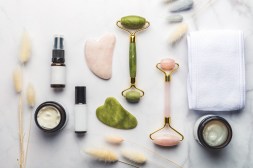How to Make DIY Face Masks with Items from Your Kitchen
In recent years, DIY face masks have gained popularity as an affordable and accessible way to take care of your skin. With the right ingredients from your kitchen, you can create effective face masks that address various skin concerns. From hydrating masks to exfoliating scrubs, there’s a DIY mask for everyone. In this article, we will explore different recipes and techniques for making DIY face masks using kitchen ingredients.
Benefits of DIY Face Masks
DIY face masks offer numerous benefits for your skin. First and foremost, they are cost-effective compared to store-bought masks. Most kitchen ingredients used in homemade face masks are readily available and inexpensive. Additionally, these natural ingredients are free from harsh chemicals that may irritate sensitive skin.

Another advantage of DIY face masks is the ability to customize them according to your specific skin type and concerns. Whether you have dry, oily, or combination skin, there’s a homemade mask recipe that can address your needs. By experimenting with different ingredients and combinations, you can create a personalized skincare routine that works best for you.
Hydrating Face Masks
Dry or dehydrated skin can benefit greatly from hydrating face masks made with kitchen ingredients. One effective recipe involves mixing mashed avocado with honey and plain yogurt. Avocado is rich in healthy fats that nourish the skin while honey provides hydration and has antibacterial properties.
Another popular option is a banana-based mask mixed with oats and milk. Bananas are packed with vitamins that help moisturize the skin while oats gently exfoliate dead cells away. Milk adds extra hydration and contributes to a smoother complexion.
Exfoliating Scrubs
Exfoliation is an essential step in any skincare routine as it helps remove dead skin cells and unclog pores. Making your own exfoliating scrub at home is not only easy but also allows you to control the level of exfoliation.
One simple yet effective recipe for an exfoliating scrub involves combining brown sugar, honey, and olive oil. Brown sugar acts as a natural exfoliant, while honey and olive oil provide moisture and nourishment to the skin. Gently massaging this scrub onto your face in circular motions will leave your skin feeling smooth and refreshed.
For a more invigorating experience, you can try a coffee-based scrub. Mix coffee grounds with coconut oil and a small amount of cinnamon for added benefits. The caffeine in coffee helps stimulate blood circulation, while coconut oil moisturizes the skin. Cinnamon has antibacterial properties that can help fight acne-causing bacteria.
Brightening Masks
If you’re looking to achieve a brighter complexion, there are several kitchen ingredients that can help. One popular option is a turmeric mask mixed with yogurt and lemon juice. Turmeric has anti-inflammatory properties that can help reduce redness and even out skin tone. Yogurt provides hydration, while lemon juice acts as a natural brightening agent due to its high vitamin C content.
Another brightening mask recipe involves blending strawberries with honey and plain yogurt. Strawberries contain natural antioxidants that can help improve skin elasticity and promote an overall youthful appearance. Honey adds moisture, while yogurt soothes the skin.
Conclusion
Making DIY face masks using kitchen ingredients is not only fun but also beneficial for your skin. From hydrating masks to exfoliating scrubs and brightening treatments, there’s a homemade mask recipe suitable for every skincare concern. By exploring different combinations of ingredients, you can create personalized masks that address your specific needs without breaking the bank or exposing your skin to harsh chemicals. So why not give it a try? Your glowing complexion will thank you.
This text was generated using a large language model, and select text has been reviewed and moderated for purposes such as readability.











